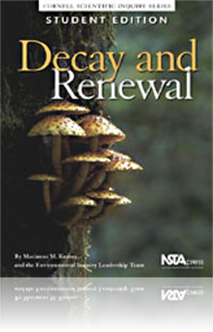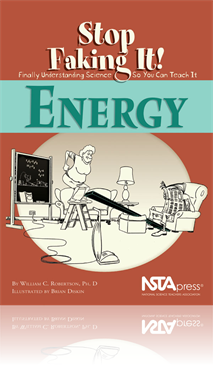All Middle School resources
NSTA Press Book
Sound: Stop Faking It! Finally Understanding Science So You Can Teach It
Muddled about what makes music? Stuck on the study of harmonics? Dumbfounded by how sound gets around? Now you no longer have to struggle to teach concepts you really don’t grasp yourself. Sound takes an intentionally light touch to help out all...
By William C. Robertson, Ph.D.
NSTA Press Book
Light: Stop Faking It! Finally Understanding Science So You Can Teach It
Why is left right and right left in the mirror? Baffled by the basics of reflection and refraction? Wondering just how the eye works? If you have trouble teaching concepts about light that you don’t fully grasp yourself, get help from a book that�...
By William C. Robertson, Ph.D.
NSTA Press Book
Decay and Renewal (Student Edition)
Most of us throw or flush things away every day without thinking about the fact that there is no “away.” Whether discarded substances break down or not, they affect our environment. By investigating the processes in wastewater treatment, composti...
By Nancy M. Trautmann, The Environmental Inquiry Team
NSTA Press Book
Everyday Assessment in the Science Classroom
Make ongoing, classroom-based assessment second nature to your students and you. Everyday Assessment in the Science Classroom is a thought-provoking collection of 10 essays on the theories behind the latest assessment techniques. The authors offer in...
NSTA Press Book
The Lingo of Learning: 88 Education Terms Every Science Teacher Should Know
What does “constructivism” mean? What is the difference between “reliability” and “validity?” You’ll be surprised at the ease of finding definitive answers to terminology questions like these with The Lingo of Learning. Ideal for the ti...
By Alan Colburn
Book Chapter
This first chapter deals with one of the most basic principles of motion, which happens to be known as Newton’s first law. Not coincidentally, it has something to do with Isaac Newton. It’s a nice law to start out with because it doesn’t requir...
Book Chapter
Round and Round and Round in the Circle Game
If you recognize where the title of this chapter came from, then you're showing your age and your taste for FM music in the old days. For the record (and it was a record), it comes from a song written by Joni Mitchell. Anyway, this chapter is all a...
Book Chapter
Energy is such a common notion. We talk about it all the time. Should you buy energy-efficient windows? The country needs an energy policy. That little kid at the store who screaming at the top of his lungs sure has a lot of energy. This chapte...
Book Chapter
Up until now, we've been talking about things having a certain amount of energy and not about things gaining, losing, or changing their form of energy. We've already seen how energy can change, though. A marble at rest at the top of a ramp has a ce...
Book Chapter
It Slices, It Dices--It Gathers Dust!
In case you can't tell from the title, this chapter is about machines. No, not salad shooters and makers of julienne fries but rather everyday things such as scissors and bottle openers and car jacks. These are known as simple machines, and they in...





